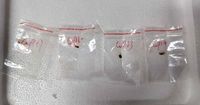On June 3, 2025, federal prosecutors in the United States charged two Chinese nationals, Yunqing Jian and Zunyong Liu, with smuggling a dangerous biological pathogen into the country, raising serious national security concerns. The pathogen, Fusarium graminearum, is a fungus scientifically classified as a potential agroterrorism weapon due to its ability to cause "head blight," a devastating disease affecting wheat, barley, maize, and rice crops worldwide.
The Justice Department revealed that Jian, 33, a postdoctoral fellow at the University of Michigan's Molecular Plant-Microbe Interaction Laboratory, and Liu, 34, who works at a Chinese university researching the same pathogen, conspired to bring the fungus into the United States. Liu allegedly smuggled the fungus through Detroit Metropolitan Airport in July 2024, concealed in four small plastic baggies tucked inside a wad of tissues in his backpack.
Initially, Liu denied knowledge of the materials, suggesting someone else had planted them in his luggage. However, after further questioning, he admitted to intentionally hiding the samples to evade detection by Customs and Border Protection (CBP) officers, stating, "I intentionally hid the samples in my backpack because I knew there were restrictions on the importation of the materials." He confirmed that he placed the samples in tissues so they would be less likely to be found and confiscated, enabling him to continue his research at the University of Michigan laboratory where Jian worked.
The FBI's criminal complaint detailed that the couple had been researching Fusarium graminearum since their university days in China. Electronic communications recovered from their devices revealed discussions about smuggling seeds into the United States. In 2022, Liu messaged Jian, "I put them in my Martin boots. In a small bag. The ziplock bag. Very small," to which Jian replied, "That's good. Just put it in your shoes." These messages underscore the premeditated nature of their actions.
Jian denied any knowledge of Liu's smuggling activities or plans to conduct research on the pathogen when questioned by investigators. Despite this, the evidence points to a coordinated effort. Liu reportedly intended to use the University of Michigan's laboratory facilities to further study the fungus.
Fusarium graminearum is notorious for causing billions of dollars in economic losses globally each year. The fungus produces toxins that can lead to vomiting, liver damage, and reproductive defects in livestock and humans, posing a significant threat to agricultural economies and public health.
U.S. Attorney Jerome Gorgan emphasized the gravity of the case, stating, "The alleged actions of these Chinese nationals — including a loyal member of the Chinese Communist Party — are of the gravest national security concerns." The complaint alleges that Jian's electronic devices contained information indicating her membership in and loyalty to the Chinese Communist Party, adding a layer of geopolitical sensitivity to the case.
Attorney General Pam Bondi highlighted the Justice Department's commitment to protecting the American people, saying, "The Justice Department has no higher mission than keeping the American people safe and protecting our nation from hostile foreign actors who would do us harm." She praised the efforts of DOJ attorneys in bringing the defendants to justice, who face years behind bars for their clandestine attempt to introduce a destructive substance into the country.
Marty C. Raybon, Director of Field Operations for U.S. Customs and Border Protection, underscored the critical role CBP plays in guarding against biological threats that could devastate the agricultural economy and harm human health. He noted, "Today’s criminal charges levied upon Yunqing Jian and Zunyong Liu are indicative of CBP’s critical role in protecting the American people from biological threats that could devastate our agricultural economy and cause harm to humans; especially when it involves a researcher from a major university attempting to clandestinely bring potentially harmful biological materials into the United States."
The FBI Counterintelligence Division led the investigation, with Cheyvoryea Gibson, special agent in charge of the FBI Detroit Field Office, warning that the pair's actions "posed an imminent threat to public safety." Jian was scheduled to appear in federal court in Detroit on the afternoon of June 3, 2025, where a judge ordered her to remain behind bars, citing her as a flight risk. Liu, who was not permitted entry into the U.S. after the pathogen was discovered in his luggage, remains at large.
The University of Michigan issued a statement condemning any actions that threaten national security or undermine the institution's public mission. The university emphasized that it had received no funding from the Chinese government related to the research conducted by Jian and Liu and pledged full cooperation with federal law enforcement in the ongoing investigation and prosecution.
This case shines a spotlight on the challenges faced by American institutions in safeguarding sensitive research and preventing the illicit transfer of potentially dangerous biological materials. It also highlights the broader geopolitical tensions and concerns about espionage and biothreats in the realm of scientific research.
As the legal process unfolds, authorities remain vigilant against threats that could jeopardize the nation's agricultural security and public health. The charges against Jian and Liu serve as a stark reminder of the vigilance required to protect the United States from covert attempts to introduce hazardous pathogens under the guise of scientific research.




